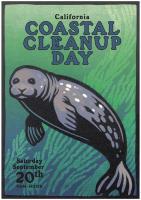
Field trips are good for people of all ages. I recently joined up with a group of students from Cal Poly, SLO (translation: California Polytechnic University, San Luis Obispo) to celebrate Coastal Cleanup Day.
Coastal Cleanup Day was first held in Oregon in 1984. California’s Coastal Cleanup Day began the following year and has been successfully cleaning beaches for 30 years. http://www.coastal.ca.gov/
The event is now internationally sponsored by the Coastal Conservancy and has become the largest volunteer event in the world. http://www.oceanconservancy.org/
People of all ages can participate in Coastal Cleanup Day. In California, there were over 54,000 volunteers who collected 686,000 pounds of trash.
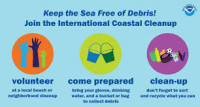 Our group met on the beach in Cayucos, CA. We spend so much time on this beach that it is only fitting that we help take care of it. We brought our own buckets and gloves and set out with a check list provided by ECOSLO. http://www.ecoslo.org
Our group met on the beach in Cayucos, CA. We spend so much time on this beach that it is only fitting that we help take care of it. We brought our own buckets and gloves and set out with a check list provided by ECOSLO. http://www.ecoslo.org
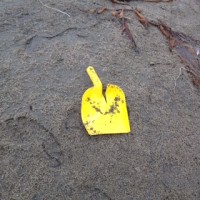
We found sand toys
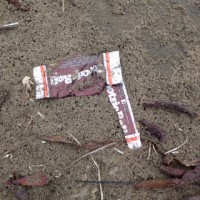 Candy wrappers
Candy wrappers
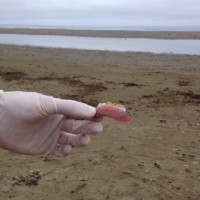 And fake hillbilly teeth!
And fake hillbilly teeth!
Some of the other odd items found along California’s coast were a polar bear costume, a horse saddle and a cash register.
Besides being a great way to spend a day, Coastal Cleanup Day raises awareness of the dangers of trash ending up in the ocean and other waterways creating hazardous conditions for ocean wildlife.
Along with cleaning up trash, it is important to learn more about the causes and effects of trash on the marine environment. Here are three books that I recommend for sharing with budding oceanographers:
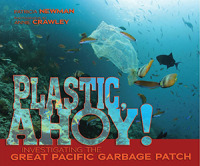
Plastic Ahoy! Investigating the Great Pacific Garbage Patch by Patricia Newman and Annie Crawley chronicles the research of three female scientists who lived and worked on the research ship, New Horizon. They spent time investigating the Great Pacific Garbage Patch which is a huge area of plastic debris caught between currents in the North Pacific Gyre. The text is clear in its descriptions and explanations of marine life, ocean currents, marine food chains and much more. This book make science exciting and shows how it can help to solve real life problems. The author gives concrete solutions for children to implement to help reduce the problem of ocean bound rubbish. This is a great book to encourage young scientists and oceanographers.
Check out this trailer for the book: http://patriciamnewman.com/plastic.html
![]()
Tracking trash: Flotsam, Jetsam, and the Science of Ocean Motion written by Loree Griffin Burns follows oceanographer Dr. Curtis Ebbesmeyer as he studied ocean currents, tides and wind by tracking items such as a shipment of tennis shoes that fell off a cargo ship into the ocean. This is a well written nonfiction book which explains the scientific process that begins with curiosity and questions and results in furthering knowledge about the marine environment.
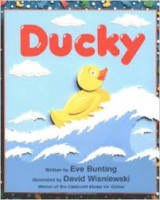
Ducky written by Eve Bunting and illustrated by David Wisniewski is perfect for the youngest ocean lovers. Based on a true story of a load of bathtub toys that falls off of a cargo ship, a yellow toy duck describes his ocean journey until finally arriving (along with his other bathtub toy friends) on beaches.
This book is simply told but has it all – scary moments, loneliness, and a happy ending. The illustrations are beautiful and the author includes information about the 29,000 plastic toys and how their travels were used by scientists to learn more about ocean currents.
What do you do when you see trash on a beach?
Sounds like lots of fun despite the fact that trash on the beach is not fun. I had no idea that this CA coastal event was internationally known. The books you suggest sound great too. I actually know Ducky and I found the true story quite amazing.
When I find trash on a beach, I collect it. In Maine where I spend more time on the beach than in California, I rarely find trash but lots of wood and other natural things that drift on the beach. My kids used to make huts with the logs and branches and decorated with shells.
I love to walk the beach – I used to collect seashells but now only search for sea glass.
So much rubbish on our beaches and in the sea.
Must be an answer to this.
Cheers Sharon…